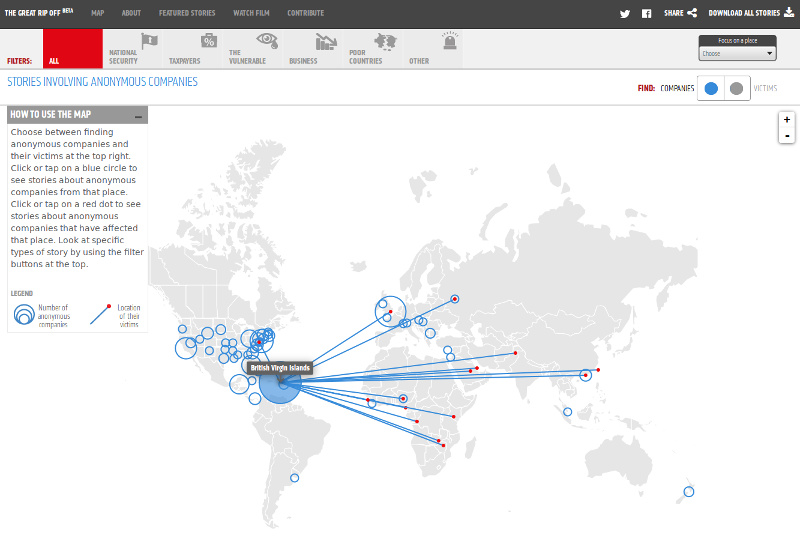This past week, I joined Gunner to facilitate the Transparency and Accountability Initiative's "Using Technology to Follow the Money" workshop in Berlin. We met over a hundred activists, journalists, technologists, and funders who traveled from all over the world to have dialogues about how to better use financial data to make social change.
What does it mean to “Follow the Money”, and how can financial data lead to social change? Answers to this question change based on where in the world you are asking, and lead to no single answer.
Many of the participants at #FTMTech agreed that improving the clarity of this answer is a key challenge for growing their movement. As a newcomer to the Follow The Money space, I was introduced to concepts such as “Beneficial Ownership”, which became clear by being surrounded by 100 or so of the most informed and articulate people I could hope to ask.
Who benefits?
"Beneficial Ownership refers to the person who ultimately benefits the most from a company,” explains Robert Palmer, the head of Global Witness' bank and corruption campaign.
This is different from the legal owner who's name is on paper. The company belonging to the legal owner might be a shell company based in a country with fewer transparency requirements, with a variety of shareholder companies registered all over the world.
For example, an oil company in one country may secretly be owned (i.e., beneficially owned) by a politician who regulates oil extraction in that very country, and wires money through hidden avenues. The Great Ripoff by Global Witness does a great job visualizing some of these global mechanisms:

The Great Ripoff Map, from Global Witness lists dozens of examples of abusive anonymous companies exposed by “following the money".
Robert sums up the challenge ahead by explaining that “most people are generally aware that banks are involved in this, but not the mechanisms by which it works.” The participants that attended the workshop are working from different angles to spread their awareness of the subtle mechanisms of anonymous money to the broader public.
Some folks work specifically around “extractives” (timber, gas, and other natural resources) to ensure that value from resources is returned to the people of the host country. Others work in banking, to ensure that companies and wealthy citizens pay their fair share. Still others focus on public procurement, to prevent corrupt governments from diverting public money to private benefactors. The methods and targets might vary, but the Follow the Money movement is working to trace those ownership pathways, expose corruption, and pass new laws to prevent these abuses of power.
Visualizing global contexts
Certain types of data might be legally required for disclosure in the United States, but those same types of data can carry legal consequences if even possessed by journalists in South Africa. A challenge that quickly emerged at the workshop was the navigating the various contexts in which financial data flows.
To illustrate the diversity of laws and data landscapes, we designated a dozen spaces around the venue for a round of geographic storytelling, where a person from each country or region hosted a discussion, and everyone else self-selected where they wanted to learn more.
Participants from Cameroon, Ghana, Nepal, Kenya, and South Africa held incredible discussions. The whole continent of Europe was combined into one session (except Slovakia, which stood on its own). And the United States had a session, but not a very well attended one. It was wonderful to see people moving into different currents to learn about what was in play beyond their backyard.
Responsible Data session
The rest of the workshop took the form of various small collaborative working sessions. Four to ten people clustered around a narrow topic for about an hour, and strove to produce a small but meaningful output.
One of these sessions aimed to produce a guide for the people who handle sensitive financial data for the purpose of investigative journalism. This guide was meant to highlight questions one should consider before potentially putting themselves or others at risk. Taking these kinds of considerations is a way of practicing “responsible data”.
Handling certain types of data can come with potentially life-altering consequences which are often unpredictable. In addition to the source and the reporter, people who collect, possess, and publish sensitive data can also be put at risk. Being a responsible data practitioner means closely examining these scenarios before acting.
While it proved challenging to make a thorough responsible data guide in an hour, it was a jumping-off point that motivated us to ask more questions of a broader group. Some of the workshop participants intend to attend the Responsible Data Forum in Manila in two months, which would present a great opportunity for us to circulate this list among our networks, find its flaws, and come together again to make it better — of perhaps, discover that we need to start anew. Either way, a built-in follow-up strategy is a welcome feature to any workshop session, and one in which I personally look forward to participating.
Starting the ask the right questions...
As often happens, I left this event with more questions than answers about transparency and accountability. But I have gotten closer to asking the right questions:
- How do differing legal environments create and implement transparency requirements?
- How can transparency work in communities with very limited technology and Internet access?
- What are the responsibilities of funders to the organizations that track financial accountability?
- And how can these narratives be told clearly, or even visually?
Much gratitude to the Transparency and Accountability Initiative (Vanessa, Andrea, Kristian, and Jed) and all the participants (Dirk, Beatrice, Zara, and so many more) for creating and holding the space, as well as Ela from Supermarkt for hosting us!
Interested in learning more about Follow the Money? Here are some of my favorite stories and perspectives I heard during the workshop. Here's a few blogs I recommend checking out:
- The Offshore Game: Tracing the tax havens and secrecy jurisdictions of the UK football league
- Zara Rahman: Developing effective technology tools: less shiny, more useful

